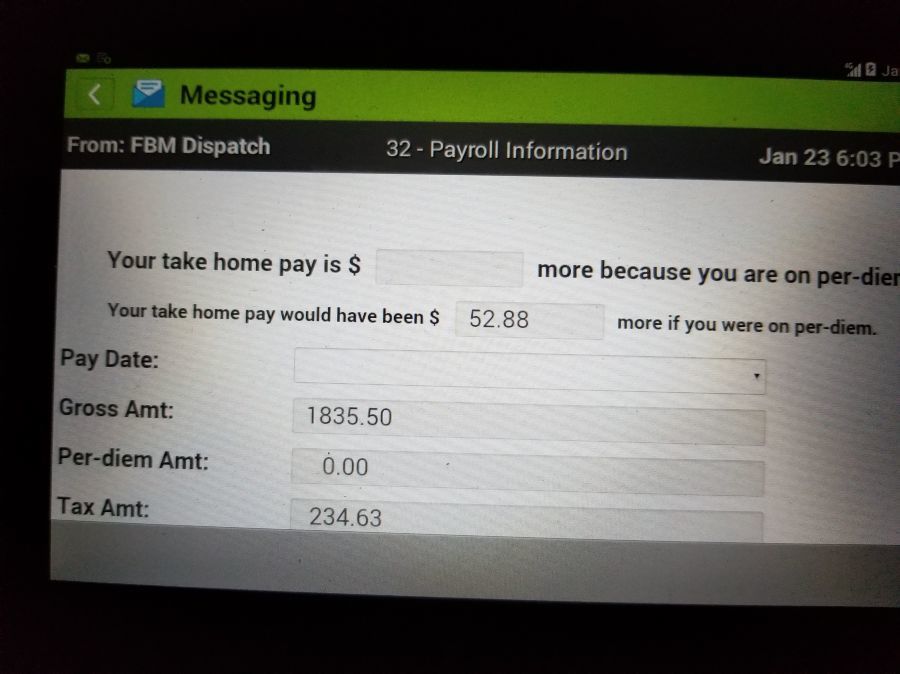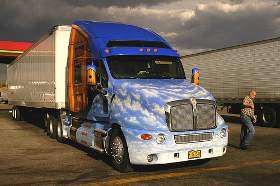Starting Own Trucking Authority......No CDL
Topic 24390 | Page 2
I should add I made 75k last year, but I didnt work as much as I could have. Some of our top guys are making up to 120k and they are home daily and off twice a week.
TWIC:
Transportation Worker Identification Credential
Truck drivers who regularly pick up from or deliver to the shipping ports will often be required to carry a TWIC card.
Your TWIC is a tamper-resistant biometric card which acts as both your identification in secure areas, as well as an indicator of you having passed the necessary security clearance. TWIC cards are valid for five years. The issuance of TWIC cards is overseen by the Transportation Security Administration and the Department of Homeland Security.

Where are you located? If your location is good you could land a pretty lucrative line-haul type job pulling doubles. You can make 80,000 plus dollars a year and be home on weekends, maybe even home nightly.
Southern California.
I'm capped out (salary wise) in my current office job (60k being the highest I'll ever make) and I'm sure most of you are aware that 60k for a large family in Southern California is extremely difficult to make it.
It's my understanding that if I drive for a company with no CDL (Swift for example), they pay their drivers $700 a week and it takes like 3-6 months to start making more than that.
I simply can't survive on that income and would have to figure out how to survive for 6 months.
I'm sure it gets better after the 6 months but if I could make at least 1k a week (which is at least equal to what I make now), it would be something I'd jump into right now.
CDL:
Commercial Driver's License (CDL)
A CDL is required to drive any of the following vehicles:
- Any combination of vehicles with a gross combined weight rating (GCWR) of 26,001 or more pounds, providing the gross vehicle weight rating (GVWR) of the vehicle being towed is in excess of 10,000 pounds.
- Any single vehicle with a GVWR of 26,001 or more pounds, or any such vehicle towing another not in excess of 10,000 pounds.
- Any vehicle, regardless of size, designed to transport 16 or more persons, including the driver.
- Any vehicle required by federal regulations to be placarded while transporting hazardous materials.
Doubles:
Refers to pulling two trailers at the same time, otherwise known as "pups" or "pup trailers" because they're only about 28 feet long. However there are some states that allow doubles that are each 48 feet in length.
My recommendation would be to do some research on linehaul and see you are interested in it, basically you run from 1 company terminal to another usually at night. Generally it is some the best paying jobs in trucking but it certainly lacks the adventures of OTR.
I would then call my local LTL companies such as Old Dominion, YRC, XPO, USF Holland and see what they have available.
You may have to go to private school to avoid working on their dock to driver programs, but once your CDL you will start at least .10+ cpm more than most OTR companies. I have been with Old Dominion since September 2017 and generally gross 12-1400 a week without a problem.
CDL:
Commercial Driver's License (CDL)
A CDL is required to drive any of the following vehicles:
- Any combination of vehicles with a gross combined weight rating (GCWR) of 26,001 or more pounds, providing the gross vehicle weight rating (GVWR) of the vehicle being towed is in excess of 10,000 pounds.
- Any single vehicle with a GVWR of 26,001 or more pounds, or any such vehicle towing another not in excess of 10,000 pounds.
- Any vehicle, regardless of size, designed to transport 16 or more persons, including the driver.
- Any vehicle required by federal regulations to be placarded while transporting hazardous materials.
Terminal:
A facility where trucking companies operate out of, or their "home base" if you will. A lot of major companies have multiple terminals around the country which usually consist of the main office building, a drop lot for trailers, and sometimes a repair shop and wash facilities.
LTL:
Less Than Truckload
Refers to carriers that make a lot of smaller pickups and deliveries for multiple customers as opposed to hauling one big load of freight for one customer. This type of hauling is normally done by companies with terminals scattered throughout the country where freight is sorted before being moved on to its destination.
LTL carriers include:
- FedEx Freight
- Con-way
- YRC Freight
- UPS
- Old Dominion
- Estes
- Yellow-Roadway
- ABF Freight
- R+L Carrier
OTR:
Over The Road
OTR driving normally means you'll be hauling freight to various customers throughout your company's hauling region. It often entails being gone from home for two to three weeks at a time.
Linehaul:
Linehaul drivers will normally run loads from terminal to terminal for LTL (Less than Truckload) companies.
LTL (Less Than Truckload) carriers will have Linehaul drivers and P&D drivers. The P&D drivers will deliver loads locally from the terminal and pick up loads returning them to the terminal. Linehaul drivers will then run truckloads from terminal to terminal.CPM:
Cents Per Mile
Drivers are often paid by the mile and it's given in cents per mile, or cpm.
If you want to jump in and make a small fortune, start with a large fortune. I am an O/O leased onto a mega with my own, paid-for truck and it can be a tough go. I would not recommend it to anyone with zero experience driving.

My recommendation would be to do some research on linehaul and see you are interested in it, basically you run from 1 company terminal to another usually at night. Generally it is some the best paying jobs in trucking but it certainly lacks the adventures of OTR.
I would then call my local LTL companies such as Old Dominion, YRC, XPO, USF Holland and see what they have available.
You may have to go to private school to avoid working on their dock to driver programs, but once your CDL you will start at least .10+ cpm more than most OTR companies. I have been with Old Dominion since September 2017 and generally gross 12-1400 a week without a problem.
Thanks!
CDL:
Commercial Driver's License (CDL)
A CDL is required to drive any of the following vehicles:
- Any combination of vehicles with a gross combined weight rating (GCWR) of 26,001 or more pounds, providing the gross vehicle weight rating (GVWR) of the vehicle being towed is in excess of 10,000 pounds.
- Any single vehicle with a GVWR of 26,001 or more pounds, or any such vehicle towing another not in excess of 10,000 pounds.
- Any vehicle, regardless of size, designed to transport 16 or more persons, including the driver.
- Any vehicle required by federal regulations to be placarded while transporting hazardous materials.
Terminal:
A facility where trucking companies operate out of, or their "home base" if you will. A lot of major companies have multiple terminals around the country which usually consist of the main office building, a drop lot for trailers, and sometimes a repair shop and wash facilities.
LTL:
Less Than Truckload
Refers to carriers that make a lot of smaller pickups and deliveries for multiple customers as opposed to hauling one big load of freight for one customer. This type of hauling is normally done by companies with terminals scattered throughout the country where freight is sorted before being moved on to its destination.
LTL carriers include:
- FedEx Freight
- Con-way
- YRC Freight
- UPS
- Old Dominion
- Estes
- Yellow-Roadway
- ABF Freight
- R+L Carrier
OTR:
Over The Road
OTR driving normally means you'll be hauling freight to various customers throughout your company's hauling region. It often entails being gone from home for two to three weeks at a time.
Linehaul:
Linehaul drivers will normally run loads from terminal to terminal for LTL (Less than Truckload) companies.
LTL (Less Than Truckload) carriers will have Linehaul drivers and P&D drivers. The P&D drivers will deliver loads locally from the terminal and pick up loads returning them to the terminal. Linehaul drivers will then run truckloads from terminal to terminal.CPM:
Cents Per Mile
Drivers are often paid by the mile and it's given in cents per mile, or cpm.
Victor you're gonna have to realize how critical productivity is in this job. It is a performance based income. Rookie drivers just have a hard time breaking into the really great money that's available to the street smart experienced drivers. I see it all the time. Many rookie drivers give up long before they get the hang of things. Some of them never "get it" and settle for making half of their potential.
Personally it took me about four years to really get my stride out here. I'm a top producer now getting plenty of special treatment and excellent wages. That takes time, and a really strong track record of over performing your dispatcher's expectations. That is not easy, nor will it happen quickly. There is a lot more to this than most people realize.
The potential for success is here for anyone to capitalize on, but the reality is that only about 4 or 5% of the people who try it truly go on to a successful career. That's how tough it is. There are literally thousands of new drivers starting this career each month, and literally that many bailing out at the same time.
Just for the sake of illustration I'm going to show you my pay stub this week. It was a typical week for me (3,300 miles), but it would be an unheard of week for most new drivers.

I work really crazy hours and love what I do. Eighty hour weeks are very common for me, and I really only go home for a couple of days each month. My point in all this is to help you realize the commitment involved in this career. You can't get to the top levels of pay without proving you are worth it. We don't have salaries, we only get paid for what we accomplish. That can be a blessing or a curse depending on your ability to make things happen out here. If you do this you'd better be prepared for a lean year and a half, and if you screw up some equipment you may be finished. It's not easy, but it is rewarding.
Dispatcher:
Dispatcher, Fleet Manager, Driver Manager
The primary person a driver communicates with at his/her company. A dispatcher can play many roles, depending on the company's structure. Dispatchers may assign freight, file requests for home time, relay messages between the driver and management, inform customer service of any delays, change appointment times, and report information to the load planners.Understand a 34 hour break at home is NOT a normal persons "weekend off". it means you just put in 14 hours then need to drive home. Then you sleep, get up eat, shower see.family and then sleep again to get rested for your next week. and drive back to the terminal. Your 34 break starts from when you parked the truck and ends when you return.
just a thought.
Terminal:
A facility where trucking companies operate out of, or their "home base" if you will. A lot of major companies have multiple terminals around the country which usually consist of the main office building, a drop lot for trailers, and sometimes a repair shop and wash facilities.

Hi victor
Like old school said, it is an all in career. Unfortunately driving a truck is not a weekend hustle for extra income.
I would recommend calling up some driving schools and seeing what kind of opportunities in your area if you do decide to make a switch.
Good luck man.
Honestly, given your situation I can't imagine you getting started in trucking as a business owner. I love the idea of Linehaul for you considering your family situation. But it's highly unlikely you're going to get anywhere as a business owner in a commodity industry requiring huge capital expenditures and managing so many complexities.
If you wanted to drive and could find a job that was an upgrade in salary over where you're at I'd say consider that and then invest anything you'd like to invest in the stock market. That is a much safer, easier route to go than plopping down a massive pile of cash and going all-in on a commodity business like trucking, especially with no experience and no advantages going for you.
Linehaul:
Linehaul drivers will normally run loads from terminal to terminal for LTL (Less than Truckload) companies.
LTL (Less Than Truckload) carriers will have Linehaul drivers and P&D drivers. The P&D drivers will deliver loads locally from the terminal and pick up loads returning them to the terminal. Linehaul drivers will then run truckloads from terminal to terminal.New Reply:
New! Check out our help videos for a better understanding of our forum features

















Preview:
This topic has the following tags:
Advice For New Truck Drivers Getting Your CDL Leasing A Truck Owner Operator Truck Drivers Tax Questions







 TT On Facebook
TT On Facebook
Welcome Victor, your fighting an uphill battle... Do you personally know a freight broker??? Reason I ask is the big guys usually will not work with you unless you have had your authority for at least a year... The money you have on hand isn’t even enough to think about getting started. The buy a truck from a reputable dealer you will need between 20-30% down payment. Then a years worth of insurance, just to get started. Then you need a trailer.. What type are you looking at??? Tags, heavy use tax, and other associated startup costs will run you roughly 5-10k. A friend of mine recently bought his own truck and trailer, a flatbed. He bought a 1999 KW W900 in great shape. His trailer is a 2006 year model. He did pay cash for the truck and trailer. He shelled out just shy of 80K to put that truck on the road. Also I know of no insurance company that will touch a driver under 2 years experience. The big carriers are self insured is why they can hire students and new drivers. This is just a quick look at what you are looking at. It does go much deeper, I just hit the high points. Good luck too you
EPU:
Electric Auxiliary Power Units
Electric APUs have started gaining acceptance. These electric APUs use battery packs instead of the diesel engine on traditional APUs as a source of power. The APU's battery pack is charged when the truck is in motion. When the truck is idle, the stored energy in the battery pack is then used to power an air conditioner, heater, and other devices